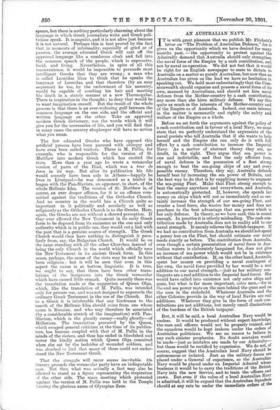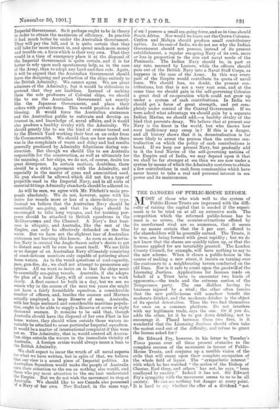AN iIISTRALLIN NAVY.
IT is with great pleasure that we publish Mr. Fitchett's letter on " The Problem of Australian Defence," for it gives us the opportunity which we have desired for many months past, — the opportunity to protest against the Admiralty demand that Australia should only strengthen the naval force of the Empire by a cash contribution, and not by naval co-operation. We did not feel that it would be right for an English newspaper to seem to' dictate to Australia on a matter so purely Australian, but now that an Australian has given us the lead we have no hesitation in speaking out. We hold most unhesitatingly that the Com- monwealth should organise and possess a naval force of its own, manned by Australians, and should not hire naval defence from the Mother-country by a cash contribution any more than -she hires military defence. We say this quite as much in the interests of the Mother-country and of the Empire as of Australia. Indeed, our main interest in the matter is necessarily and rightly the safety and welfare of the Empire as a whole.
Before we set forth the arguments against the policy of a cash contribution and in favour of a local Navy, we must state that we perfectly understand the arguments of the naval purists who tell Australia that if she wants to help herself and the Empire she can only do it with full effect by a cash contribution to increase the Imperial Navy. As a matter of abstract theory they are, no doubt, in the right. They argue that sea power is one and indivisible, and that the only efficient form of naval defence is the possession of a fleet strong enough to beat the sea-going ships of any and every possible enemy. Therefore, they say, Australia defends herself best by increasing the sea power of Britain, and the best way to do that is by supplying money to augment the sea-going Fleet. Make that Fleet strong enough to beat the enemy anywhere and everywhere, and Australia is automatically protected. If, however, she spends her money on ships which will not so immediately and so cer- tainly increase the strength of our sea-going Fleet, and creates a local force, she wastes her money and does not purchase to the best advantage that sea power which is her only defence. In theory, as we have said, this is sound enough. In practice it is utterly misleading. The cash con- tribution made by Australia does not in reality add to our naval strength. It merely relieves the British taxpayer. If we had no contribution from Australia we should not spend a penny less on the Fleet, but should estimate our naval needs exactly as before. The contribution from Australia, even though a certain presentation of naval force in Aus- tralian waters is elaborately bargained for, does not give an increase of sea power which would not be in existence without that contribution. If, on the other hand, Australia spent her money on providing a naval contingent of her own, the naval force provided by her would be a real addition to our naval strength,—just as her military con- tingents are a real addition to the Imperial land forces. She would have called into 'existence not only extra ships and guns, but what is far more important, extra men,—for in the end sea power rests on the men behind the guns and on the men in the stokeliold. Whatever Australia and the other Colonies provide in the way of local Navies are real additions. Whatever they give in. the form of cash con- tributions are not additions, but merely small diminutions of the burdens of the British taxpayer.
But, it will be said, a, local Australian Navy would be useless. It would be produced without expert knowledge, the men and officers would. not be properly trained, and the squadron would be kept inshore under the orders of Australian politicians. We see no reason to believe in any such sinister prophecies. No doubt mistakes would be made—just as mistakes are made by our Admiralty— but these would be rectified by experience. We do not, of course, suggest that the Australian local Navy should be autonomous or isolated. Just as the military forces are placed under a General of experience, so the Australian Navy would be placed under an Imperial Admiral whose business it would be to carry the traditions of the British Navy into the new Service, and to train the officers and crews. But even if the value of a local Australian Navy is admitted, it will be argued that the Australian Squadron should at any rate be under the immediate orders of the Imperial Government. So it perhaps ought to be in theory in order to obtain the maximum of efficiency. In practice it had much better be under the Australian Government. They will pay the bill, and it is quite certain that they will take far more interest in, and spend much more money and trouble on, a force which is their very own. That they would in a time of emergency place it at the disposal of the Imperial Government is quite certain, and it is far better to rely upon such spontaneous help, as in the case of the Army, than to adopt any hard-and-fast rule. Again, it will be argued that the Australian Government should leave the designing and production of the ships entirely to the British Admiralty. We cannot agree. We are great admirers of the Admiralty, but it would be ridiculous to pretend that they are faultless. Instead of making them the sole producers of Colonial ships, we should like to see the Australian Government act exactly like the Japanese Government, and place their orders with private firms. This would produce a double blessing. It would force the Australian statesmen and the Australian public to cultivate and develop an interest in, and knowledge of, naval affairs, and it would also produce a healthy rivalry with the Admiralty. We should greatly like to see the kind of cruiser turned out by the Elswick Yard working their best on an order from the Commonwealth. We should then see how much there was in the complaints of waste and delay and bad results generally produced by Admiralty fidgetiness during con- struction. But though we should like to see Australia responsible for the construction, as well as ultimately for the manning, of her ships, we do not, of course, desire too great divergence. In certain matters, doubtless, there should be a strict agreement with the Admiralty, and especially in the matter of guns and ammunition used. No gun should be allowed which did not fire a type of projectile used in the Imperial Navy, and in all sorts of essential fittings Admiralty standards should be adhered to.
As will be seen, we agree with Mr. Fitchett's main pro- posals absolutely. We do not, however, agree with his desire for vessels more or less of a shore-defence type. Instead we believe that the Australian Navy should be essentially sea-going, and that its ships should be encouraged to take long voyages, and for training pur- poses should be attached to British squadrons in the Mediterranean and the Channel. A Navy's first busi- ness is ubiquity, and Australia, like the rest of the Empire, can only be effectively defended on the blue water. But we have not the slightest fear of Australian statesmen not learning this lesson. As soon as an Austra- lian Navy is created the Anglo-Saxon sailor's desire to get to distant seas will be sure to assert itself. We see little or no danger of an Australian Navy ultimately consisting of coast-defence monitors only capable of pottering about home waters. As to the vexed questions of coal-capacity, pace, gun-fire, &e., we shall not attempt to pronounce any opinion. All we want to insist on is that the ships must be essentially sea-going vessels. Australia, if she adopts the plan of a local Navy, will of course have to work slowly. A fleet cannot be built in a day, but we see no reason why in the course of the next ten years she might not have a fairly formidable squadron, a considerable number of officers, and, besides the seamen and Marines actually employed, a large Reserve of men. Australia, with her huge seaboard and considerable maritime popula- tion, ought to be able to supply a Reserve of seven or eight thousand seamen. It remains to be said that, though Australia should have the disposal of her own Fleet in her home waters, they should when outside those waters in- variably be attached to some particular Imperial squadron. It would be a matter of international complaint if this were not so. The Admiralty, that is, would control all Austra- lian ships outside the waters in the immediate vicinity of Australia. A. foreign cruise would always mean a loan to the British Admiralty. We shall expect to incur the wrath of all naval experts for what we have written, but in spite of that, we believe that our view is a sound piece of Imperial politics. An Australian. Squadron would make the people of Australia turn their attention to the sea as nothing else would, and those who pay most attention to the sea best understand the Empire. But we do not wish the movement to stop at Australia. We should like to see Canada also possessed If Navy of • her own. New Zealand, in the same way, sl ou'd possess a small sea-going force, and so in time should South Africa. Nor would we leave out the Crown Colonies. Ceylon and Malaya should produce small contributory navies. In the case of India, we do not see why the Indian Government should not possess, instead of its present establishment, a regular sea-going Navy of its own, more or less in proportion to the size and naval needs of the Peninsula. The Indian Navy should be, in part at any rate, manned by Lascars, while the officers should pass out of the British Navy into a Naval Staff Corps, as happens in the case of the Army. In this way every part of the Empire would contribute its quota of naval force. We should lose, no doubt, the present con- tributions, but that is not a very vast sum, and at the same time we should gain in the self-governing Colonies a great deal of co-operation which could not grow up under a system of cash contributions. In India we should get a force of great strength, and yet com- pletely under control of the Central Government. If we were asked what advantage we should gain by a separate Indian Marine, we should add,—a healthy rivalry of the kind that prevents decay. We believe that at present our Navy is the finest in the world, but who knows how soon inefficiency may creep in ? If this is a danger, and all history shows that it is, decentralisation is far more likely to arrest the process than the extreme cen- tralisation on which the policy of cash contributions is based. If we keep our present Navy, but gradually add to it the local Navies of the self-governing nations of the Empire and of India, we may depend upon it that we shall be far stronger at sea than we are now under a system by means of which the Admiralty contrives to obtain a few contributions in cash from communities which have never learnt to take a real and personal interest in sea power and its maintenance.















































 Previous page
Previous page